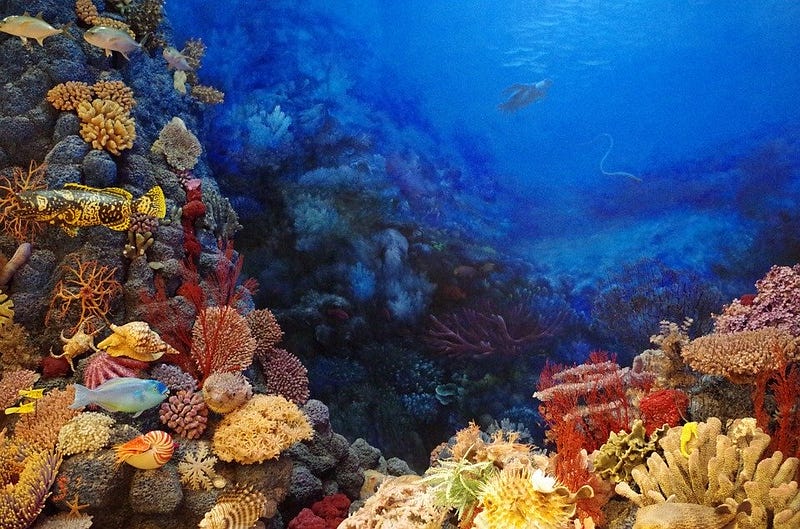How Evolution Is Helping Coral Reefs Beat the Heat
By Urjita Tendolkar, Cell and Molecular Biology, 2020

Think of the Bahamas or the Maldives. What’s the first thing that comes to your mind? Beautiful beaches? Warm weather? Crystal blue waters? Apart from the obvious beauty these places offer above sea level, they are also home to colorful and vibrant underwater ecosystems — coral reefs. Often referred as “rainforests of the ocean,” these beautiful, life-sustaining coral reefs support more than 25 percent of underwater life. They provide a stable habitat for marine animals, protect coastlines from soil erosion post-storms, supply essential nutrients for marine food chains, harbor natural resources for discovering new drugs and contribute to the fishing and tourism industry. In recent years, this diverse marine ecosystem has been threatened by increasing temperatures as a result of climate change.
For instance, warming waters often leads to a “coral bleaching” event where the corals turn completely white as they get rid of the algae living in their tissues. Since these algae support the corals by providing food, without the algae, most corals are vulnerable to mortality. Coral reefs are now at the verge of extinction since such continuous exposure to constant thermal stress takes several decades to recover from. It is estimated that almost 90 percent of coral reef populations worldwide will be dead by 2050.
It is estimated that almost 90 percent of coral reef populations worldwide will be dead by 2050.
Researchers at The University of Texas, Austin and the Australian Institute of Marine Science wanted to see whether genetic adaptation could help corals tolerate increasing temperatures. To study this, the researchers looked at a common coral Acropora millepora and used quantitative genetic and trait loci analyses to determine whether it could adapt to a changing environment. Coral species have the ability to maintain genetic connectivity across long distances, so researchers wanted to know whether heat tolerant genes would emerge in the corals threatened by increasing temperatures as a result of “genetic rescue,” or exchange of heat tolerant alleles across corals.
In the study, corals from two different, thermally divergent locations — Princess Charlotte Bay and Orpheus Island — were crossed to culture larvae. Corals were induced to reproduce sexually, a process in which eggs and sperm are released simultaneously to join and form free-floating larvae in a process called spawning. These larvae were then exposed to warm temperatures in increments over a period of time and the genes of the surviving larvae were then studied. They found that larvae from corals that were present in the warmer Princess Charlotte Bay were more likely to endure the heat exposure as compared to the larvae from the cooler Orpheus Island. They also conducted analysis of tolerance-associated genes and found that coral parents equally transmitted heat tolerant genes to the progeny. The results of this study show how natural variation to heat tolerance can be heritable among corals and is constantly evolving.
This means that corals have an ability to adapt to climate change if their natural connectivity is maintained across latitudes, providing hope for bringing back the coral reefs of the ocean to their former, colorful glory. Possible restoration projects can be undertaken to repopulate the coral community with more robust, heat-tolerant “super corals.” This would involve reengineering coral genes to create hybrids in labs then transporting them to the ocean.
While engineering corals with heat tolerant genes might seem like an attractive idea, the clock is ticking for coral reefs.
While corals can adapt to increasing temperatures, the mechanism of natural selection to build an entire ocean bed of heat resistant coral reefs is unlikely to happen in a few years. The rate at which increasing temperatures are obliterating coral reefs is alarming — almost half of the Great Barrier Reef has been lost since research into saving them began. While engineering corals with heat tolerant genes might seem like an attractive idea, the clock is ticking for coral reefs. There is a need to translate this radical idea from the lab to the ocean before it is too late.
Science (2015). DOI: 10.1126/science.1261224
